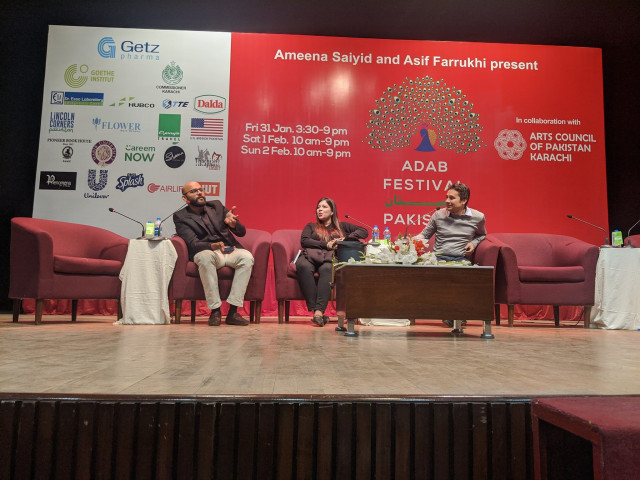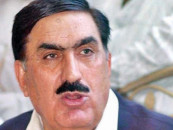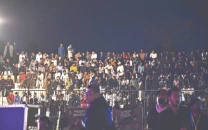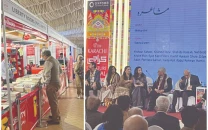'Comedy neglected as a real art form in Pakistan'
With no comedy clubs or support for comedians, they must create their own opportunities

PHOTO: ADAB FESTIVAL
The three comedians, who have each been under fire or experienced some form of backlash or the other for their material, shared their thoughts on the impact of censorship among other things during a panel discussion on comedy and satire at the second edition of the Adab Festival on Sunday.
According to Mahmood, who is an experienced content writer and a stand-up comic known for her controversial and thought-provoking comedy, there is always an air of fear or stigma attached to performing or writing about certain topics in the country. In fact, she believed that self-censorship is so deeply ingrained that she often finds herself unable to even think about certain topics when she is writing her jokes.
On the same lines, Haroon, a seasoned comedian, added that he finds that there is a general trend of adding fuel to the fire in the country and elsewhere, especially with the inception of social media. He pointed out that there were often situations when nothing offensive has even been said, but social media accounts and individuals still made it their goal to create controversy around a certain piece of work, without ever realizing that these actions have consequences for the comic.
"We actually perform live on stage and in front of people," said Haroon, who believed that being dragged into controversies, which often only involve two opposing narratives using their art to justify one point of view or the other, can lead to the artist feeling insecure when performing.
Shaheen added that as a result of this, he has on occasion received threatening phone calls, which meant that he had to censor himself; this holds true for other performers as well.
He commented that he finds that an air of anonymity makes it much easier to share content that might otherwise be censored, which is why memes are the new frontier for this type of content - the creator faces no consequences.
Haroon observed that audiences and the general public can be "so unforgiving that it's not cancel culture anymore; sometimes, they cancel you."
Space for comedy
The three also shed light briefly on the state of the comedic industry in Pakistan, in comparison to countries abroad and especially India. They stated that they found it to be a major setback that the industry is not as developed here.
Shaheen attributed this underdevelopment to several factors, prime among which are the previous YouTube ban, the lack of support for comedians by audiences and institutions alike and the exploitative nature of producers. Meanwhile, he said, other countries such as India have cultivated their comedic industry through the existence of a large-scale film industry, supportive organizations and engaged producers.
Specifically on the subject of producers, he believed that they viewed comedians as mere commodities from which they could profit.
Mahmood added to this, saying that this was because the genre is not taken seriously, with even producers perceiving it as just a way to keep up with trends.
For Shaheen, there is no institutional help for comedians here - if you want to be a successful comedian, you yourself must be an entrepreneur, investing in your work and creating your own opportunities.
But what is your real job?
"It is difficult to perform on stage and do comedy, as is the case with all other art, but we're not given any respect," says Haroon. The panel discussed at length the lack of professional recognition that comes with being a comedian, which is seen as more of a hobby than a profession.
Each had been asked multiple times in the past what their actual job was, challenging the idea that this could be a full-time job. "There is a general concept that comedians are just people that are funny; if an individual is funny, they can easily become a comedian," said Mahmood.
Haroon and Shaheen added that years of work went into a single show - which people then reduced to coming up to you in public, demanding you tell them a joke.
Is it worth it?
With no real comedy clubs and no culture that nurtures the genre, is it worth it to even continue? The three certainly still think so.
According to Mahmood, she may not get the chance to perform any given day because there are no real comedy clubs, and little demand - but even just being able to do a single show a year makes her feel like it is worth all the effort. "At the end of the day, it really is about making art."


















COMMENTS
Comments are moderated and generally will be posted if they are on-topic and not abusive.
For more information, please see our Comments FAQ